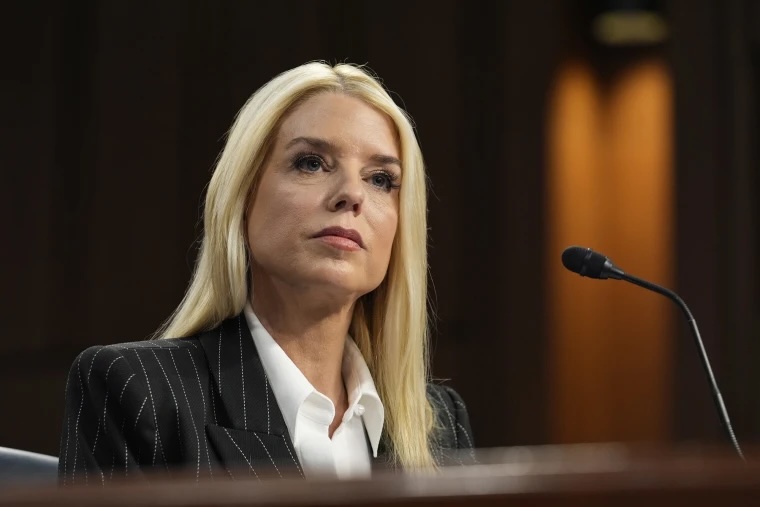By John F. Di Leo, Opinion Contributor
During her confirmation hearings for the position of Attorney General in the second Trump Administration, former two-term Florida Attorney General Pam Bondi was grilled by Senator Richard Blumenthal (D-CT) on the subject of “enemies lists.” Will she have one, will she enforce one, will she attack her fellow nominee, Kash Patel, for having published his own list of 60 known government villains in the past?
Pam Bondi is a professional. She handled the hearing perfectly, of course, confirming that she would consider the American people as her client and confirming that she would manage the Department of Justice appropriately. She dismissed Senator Blumenthal’s insinuations.
She did not take issue with the question itself.
But perhaps the rest of us should.
What, after all, is an “enemies list?”
It’s just a list of people already known to be criminal, or untrustworthy, or perhaps representatives of a foreign interest, or members of the opposition – either from your own perspective or from your country’s perspective. It’s a list of people whom you would not want to invest with authority or secrets.
The fact is, in a political nation, everyone in government has enemies lists. By definition.
If this general statement – that an enemies list is, by definition, a perfectly legitimate function of government – is shocking at all to you, please consider the fact that our government has always published numerous public enemies lists of its own.
What is the list known as “The FBI’s Ten Most Wanted Fugitives?” It’s an enemies list, identifying known criminals who the government wants to catch, prosecute, and imprison, to protect the public from them. It’s a good list.
Or how about the list known as the Special Designated Nationals and Blocked Persons List, maintained and published by the Department of the Treasury’s Office of Foreign Assets Control? This list consists of terrorists, organized crime gangs, international arms dealers, their front companies, and other companies and individuals who have been caught supporting them. It’s an enemies list, a key building block of the United States Export Controls regime. It’s illegal to ship export-controlled goods or technology to anyone on this list, either domestically or internationally. This list is critical for the security of not only the United States, but our allies as well.
The federal government manages and updates several lists of convicted child predators, such as rapists, child molesters and dealers in child pornography on parole or probation. They publish these lists so that local law-enforcement can be sure they stay away from schools and daycare centers, and so that the companies from which they are temporarily or permanently banned from working are able to do background checks and be sure not to accidentally employ one of them. This too is an enemies list; it’s hard to imagine a decent person arguing against its existence and use.
These are of course just a drop in the bucket, but should make the point. The concept of an enemies list has both a long pedigree and absolute legitimacy, both in government and outside it.
But enemies lists aren’t just about criminals. They can also – perfectly legitimately – be lists of logical potential appointees, middlemen, spokesmen, and allies. Any administration of either party, setting up their structure at the beginning, builds lots of such lists.
Who on the other side can we trust with information, versus who do we know will be leakers? Who on the other side can we negotiate with fairly, versus who do we know will call a press conference and immediately lie about what was said? Who do we believe really represents his lobby, his city, his state, or his industry, versus who do we know has proven to be more of a stalking horse for some foreign power such as China, Iran, or Russia, or has staffers that have been compromised in that direction?
This new administration will try to cross the aisle, inviting some Democrats and former Democrats to join the team; they must prepare for such considerations by noting the need to exclude people who have been caught in the past leaking information to Iran, leaking plans to Hamas, leaking negotiation bullet points to Russia, even sharing trade strategies with China. That can certainly be called building an enemies list, of course, but it would be suicide to skip this key step.
Start with the big picture. At the beginning, when building a government structure of department chiefs and other appointees, the Republican Party generally considers politicians of the Democratic Party to be enemies; and rightly so, just as the Democratic Party generally considers members of the Republican Party to be their enemies.
But as we’ve seen, it is also worth drilling down to consider how each side deals with such lists.
The Democratic Party has in recent years engaged in unprecedented lawfare, even to the point of establishing kangaroo courts, to not only prosecute President Trump on all sorts of made-up charges, but also to the point of carrying out character assassination and attempts to imprison and impoverish hundreds of people associated with President Trump, from well-known people like General Michael Flynn and Mayor Rudy Giuliani to relative unknowns such as the dozens of statesmen appointed to serve on electoral college rosters from several battleground states in 2020, and the hundreds of innocent rally attendees illegally persecuted by the Biden-Harris regime for being on the Capitol Mall on January 6, 2021.
As Senator Blumenthal was railing against the very concept of enemies lists, everyone in the audience knew full well that he had himself participated in the development of, and persecution of, his own party’s many enemies lists for years and years, particularly in endorsing AG Merrick Garland’s abuse of the power of government to harass or even destroy countless innocent citizens.
The fact is, having an enemies list is not in itself a problem at all. It just means you are being judicious; it just means you are sensibly identifying those who are or aren’t on your side, before engaging in a venture. There’s nothing in the world wrong with it.
The only problem is when you do something illegal with that list, such as illegally using the force of government to attack domestic enemies unjustly. While this is something that the Obama-Biden and Biden-Harris regimes have become notorious for doing, there is little to no evidence that Republicans ever even consider it.
This isn’t to say that Republicans are perfect, of course, just that they do not abuse the power of government that way. When Republicans prosecute enemies, it’s because those enemies have committed real crimes that need to be prosecuted. In short, in the world of law-enforcement, Republicans believe in doing their job. Democrats, by and large, do not.
This much is clear: The basic concept of an enemies list is itself an inherently good thing. A natural thing. A fundamental building block of government operations.
The problem with enemies lists is not the fact of the list, but the fact that one party in the United States is well known for abusing its power, and illegally violating the rights of innocent people who find themselves on their lists, often for something as harmless as saying a prayer, attending a rally, signing a petition, or baking cakes.
And that tells us a good deal more about Senator Blumenthal and his whole corrupt party than it does about Pam Bondi’s confirmation, doesn’t it?
By Roger Stone and Mark Vargas, Opinion Contributors Originally published in the Gateway PunditIllinois taxpayers are being asked to believe a fairy tale.They are told that Gov. JB...
Read moreDetails








